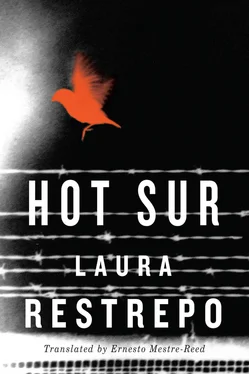“‘A factory worker?’
“‘We’re going to take you to the supervisor where we work. You’re going to work at the factory. And we’re going to get drunk to celebrate.’
“It was a blue-jeans factory, one of those sweatshops where the workers are reduced to semi-slavery and which supposedly had been closed down in New York and fined, but that in reality was still operating full force. So Bolivia would be ready for the interview, the Dominican women prepared her psychologically, calmed her nerves with homeopathic drops, and instructed her on the questions she’d have to answer. ‘Take it nice and easy,’ they advised her, so that she wouldn’t be intimidated by the bitter character of the supervisor, who was named Olvenis and was one of those dry, hard-edged guys, with quills like whiskers who would scratch you if he grazed you; an origami made out of sandpaper, that was Olvenis.
“‘When he asks you if you know how to operate industrial machinery, you say yes.’
“‘But I don’t have a clue,’ Bolivia grumbled, ‘never in my life—’
“‘You listen to us and say yes.’
“‘And how am I supposed to respond with my shitty English?’
“‘No problem. His is worse because he’s not American. The owner of the place is Martha Camps herself. You know her, right? You don’t? What world do you live in? Martha Camps, the TV star. But she’s never there. That’s why she has the supervisor who speaks almost no English. Here in New York, English is not necessary, so don’t stress out, there’s always someone who speaks it worse than you. Don’t you know how to say yes? Anything he asks, just say yes. Or is it too hard to say yes? “Yes, of course, Mr. Olvenis, thank you, Mr. Olvenis, thank you very much.”’
“‘How much do I ask for pay?’
“‘Don’t ask for anything. Just take what he gives you, and then it gets better, and if doesn’t get better you quit and go look for another place. That’s how these black-market jobs work here.’
“‘What if he asks if I have papers?’
“‘He’s not going to ask. He knows none of us do and that’s the thing, that’s how they run the business. Without papers they can pay us bad, or not pay us, depending on the mood that month.’
“They took her to a building closed off and crisscrossed with yellow tape that said ‘Police Line, Do Not Cross.’ On the front, official notices reported default for tax delinquency, and there was a heap of garbage out by the building. The windows were all broken and boarded up, and if you didn’t know better, you’d swear there were only rats and dirt inside.
“‘It’s here,’ they told her.
“‘Here?’
“‘Yeah, we go in through the back.’
“They passed through a dark wooden structure attached to the building, Chelo and Hectorita leading, Bolivia behind them, and then groped their way step-by-step up a creaky stairway.
“‘Jesus Christ! How many more floors?’
“‘Cheer up, girl, we’ve gone up five and have four more.’
“And when Bolivia was all but out of breath, she heard the rumble of machinery coming from the back. And no human voices, as if the machines ran themselves. ‘We made it, we’re here.’ They opened a metal door and the burst of light blinded them, and once the images began to take form, Bolivia was able to note the silent presence of some twenty women, all young, huddled together around large tables, each one focused on her sewing machine as if the rest of the world did not exist. She thought they looked like zombies, and she had barely taken off her coat when they seated her between two of them, in front of her own machine. For each pair of jeans they had to make they were given twelve pieces of denim, six rivets, five buttons, four labels, one zipper, and her only instruction, which the boss said once and did not repeat, was that they had thirty minutes to finish each pair of jeans. The Dominicans had made the calculations, thirty minutes a pair of jeans, twenty jeans per worker for each ten-hour shift, minus mechanical failures, human errors, lunch break, eventual power failures, and breaks to go pee for a total of three hundred to three hundred and twenty jeans made and packed every day of the year.
“‘God Almighty.’ Bolivia sighed. ‘Who is wearing all these jeans?’
“She tried to remember the directions that her friends had given her about how things worked theoretically, made a sign of the cross, said this is for my daughters, and with her right foot pressed on the pedal, only to confirm that the industrial apparatus in front of her was a living monster, a stampeding horse that swallowed cloth and tangled the threads before she could even take her foot off the pedal. Sometimes the needle caught her fingers, but it did it so quickly that when she saw the bloodstains on the denim she didn’t even know where they came from. On the third day, Olvenis had called her into the office to give her a stern talking-to, shouting, cursing at her in that English of his that sounded too much like her native tongue, and although she couldn’t understand him, she could guess what it was about. They were firing her because she was a fake, a liar, because she had never operated any industrial machinery. The blood rose to her face but then dropped in an instant. She grew pale and her vision became cloudy; there was a ringing in her ears and she thought she was going to soil herself before she dropped to the floor unconscious, right there on the cement floor of the supervisor’s office.
“‘What a ridiculous scene I put on,’ she cried to her friends that night, laid out on the mattresses and with alcohol compresses on her forehead.
“In the morning, she went back to the old woman on West Fifty-Fifth to ask forgiveness for having left her without notice and to beg her for a second chance. But the old woman had already hired an Asian woman. And in any case, that night the Dominicans had good news back in the room in Jackson Heights.
“‘That fainting worked well, Bolivia,’ they told her. ‘Olvenis felt bad, and he wants you to know you can come back, but only if you are willing to do the ironing.’
“The ironing was the worst-paid job and the hardest, especially because of all the steam and heat. She had to iron blue jeans for the whole shift in a tiny room, hot as an oven, no windows, and very little ventilation. The blind windows were no accident, the owners wanted to make sure the factory couldn’t be detected from the outside. It was summertime and Bolivia suffocated amid the mountains of jeans. After a week, she thought she’d die; after two weeks, she came back to life; after a month, she faltered again. But the memory of her two daughters kept her standing. She couldn’t take it and decided to quit, but then didn’t. She had to hold on so that she could bring her daughters as soon as possible, whatever it cost. She was bringing them; even if she dropped dead, she was going to bring them. Once a month, she’d go by the Telecom Queens on Roosevelt Avenue, where dozens of Colombians lined up for the phone booths to call home. From there she’d talk to her older daughter and cry with her. Then she’d punch in another number to try to get in touch with her younger daughter, but she was never able to. The lady who cared for the girl made some excuse. Violeta wasn’t there, or she was sleeping, or was feeling shy. She told Bolivia, ‘You have to understand, it has been a long time since she has seen her mama. Getting her trust back isn’t going to be easy; it’s not going to happen overnight. Have patience with the girl. She’s confused, her head all messed up. Have patience, it will pass.’
“And the next day, Bolivia would return to the sweatshop, and the iron, and the oppressive heat, from seven in the morning, with half an hour lunch break, just café con leche and donuts that a messenger brought and they had to eat right there, because they weren’t allowed to go down to the streets, and on top of that they had to pay for them from their own pockets, the same menu every day, café con leche and donuts, café con leche and donuts for all twenty workers every day of the week. Then in the afternoon Bolivia continued to work until five fifteen. And what was she doing there fifteen minutes later than everybody else?”
Читать дальше












